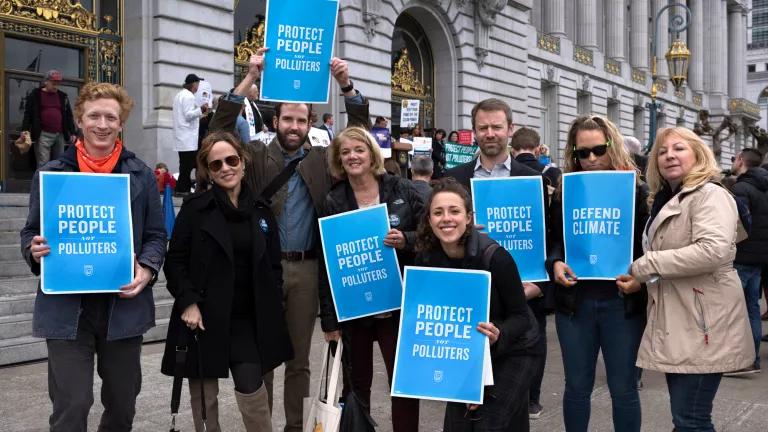2022 Sees LA Make Strides on Climate Justice
Los Angeles is ending the year with notable progress on energy justice and building decarbonization, with plans for more in 2023.

Part of NRDC’s Year-End Series Reviewing 2022 Climate and Clean Energy Developments
As 2022 comes to a close, Los Angeles is ending the year with notable progress on environmental justice, energy justice, and building decarbonization - bringing to fruition years of tireless advocacy and research from local organizations and coalitions. This year’s climate justice wins set the foundation for ambitious energy policies and programs to be explored in 2023 in partnership with community experts.
Phasing out oil drilling city-wide
Local environmental justice coalition Stand Together Against Neighborhood Drilling (STAND-LA) saw victory on December 2, 2022 when Los Angeles City Council unanimously voted to ban new oil and gas extraction activities immediately and phase out existing oil and gas wells over the next 20 years, or possibly sooner if the industry’s transition costs are lower than anticipated. This ordinance is a monumental step in the City’s long path toward correcting the longstanding racist environmental injustices that led to wells and drill sites being concentrated in Black and Latinx communities from the start. Oil wells are known to emit carcinogens like formaldehyde and benzene, and living and working in proximity to wells has been linked to serious health conditions, including respiratory illnesses and complications for pregnancies. The passage of this ordinance was a direct result of nearly a decade of leadership and advocacy by STAND-LA and other community leaders for the betterment of frontline communities and to ultimately provide a cleaner, safer city for all LA residents. Read more >>
Banning utility shutoffs for low-income Angelenos
On November 16, 2022, the Board of Commissioners of LA’s municipal utility, Los Angeles Department of Water and Power (LADWP), unanimously voted to end utility shutoffs as a tool for debt collection for low-income customers as well as for senior residents who can’t pay their utility bills. This landmark change to LADWP’s business model arose from a coordinated research and advocacy campaign by the RePower LA coalition, which sprung to action to fight the reinstatement of LADWP’s typical shutoffs practices after it was announced that COVID-19 protections would be lifted in 2023. In response, RePower partners Los Angeles Alliance for a New Economy (LAANE) and Strategic Concepts in Organizing and Policy Education (SCOPE) compiled a research report on a potential “no shutoffs” policy for the utility and presented their key findings to the Board of Commissioners on September 27, 2022, highlighting both quantitative and qualitative data on the detrimental effects of utility shutoffs, which impact majority Black and Latinx communities at a much higher rate than majority white communities. Analyzing and sharing that data proved to be a valuable and effective advocacy tool in the fight to protect access to water and electricity. Read more >>
Creating a roadmap for equitable building decarbonization
Buildings are the largest single source of greenhouse gas (GHG) emissions in LA, making up 46% of local GHGs, and as such the City identified making buildings carbon-free as critical to achieving local climate goals. In pursuit of this aim, the Climate Emergency Mobilization Commission (CEMC) voted on September 20, 2022 to approve the Report on Equitable Building Decarbonization, authored by its city staff arm, the Climate Emergency Mobilization Office (CEMO). The report synthesizes findings and recommendations for community priorities on building decarbonization legislation stemming from CEMO’s stakeholder engagement process earlier this year, which was co-designed and co-led by community experts including the RePower LA and Leap LA coalitions. The final recommendations of the report underscored the importance of investment in frontline communities and inclusive public engagement processes in the decarbonization policy development to come. The report also amplified community-defined solutions for building decarbonization’s intersectional issues of housing justice and economic justice: Strategic Actions for a Just Economy (SAJE) reported on tenant protections for building decarbonization, and Inclusive Economics reported on economic impacts and worker justice in partnership with LAANE. Read more >>
Taking local new construction all-electric
Bolstered by the findings and recommendations of the CEMO report and the specific recommendation of SAJE’s aforementioned report on tenant impacts, the City is pursuing decarbonization in phases, starting with new construction. Following the passage of the CEMO report, City staff acted quickly to draft an ordinance to ensure new buildings are constructed all-electric from the ground up, which was unanimously adopted by City Council on December 7, 2022. The adoption of this ordinance sees the City making good on the commitment to electrify all new local construction made via a motion brought forth by Councilmember Nithya Raman in February of this year. New buildings of all types are covered by this mandate, and although limited exemptions are provided for specific end uses like cooking in commercial facilities and process gas for certain industrial uses, any construction that uses an exemption must ensure that it is electric-ready for future energy transitions.The ordinance will be effective for new construction permits beginning in April 2023 for most building developments, and in June 2023 for affordable housing developments. Read more >>
What’s next on the horizon
On his last day in office preceding newly-inaugurated Mayor Karen Bass, former Mayor Eric Garcetti signed three climate-forward policies, including the oil drilling ban, the all-electric construction mandate, and an ordinance to reduce the use of plastics. For Mayor Bass to build on this momentum for equitable climate action, she must support policies that improve affordability for all Angelenos, support economic mobility without racial disparity, and build climate resilience for the city’s long-term health.
In the new year, City Council will be turning their attention to exploring a policy for decarbonizing existing buildings. In order to tackle this complicated issue, several peer cities have either passed or are preparing to pass a building performance standard - a policy tool requiring carbon-intensive buildings to ratchet down carbon emissions or energy use over time. While a performance standard is much-needed for reaching the city’s climate goals and ensuring its buildings are climate-resilient, the City will need to be well-prepared for any such policy to ensure that it would not create undue burden for already-burdened communities and would instead prioritize benefits in those communities. Accompanying incentives, assistance, and protections will be needed for buildings to achieve performance targets while preserving housing, energy, and worker justice.
Meanwhile, RePower LA continues to push for solutions to alleviate utility debt and increase access to LADWP programs that increase energy resilience and affordability, researching ways that the utility could lower rates for low-income customers while scaling up beneficial programs for customers around actions like rooftop solar installations and energy efficiency upgrades. LADWP will be releasing its 2022 Strategic Long-Term Resource Plan soon, which has a duty to prioritize these long-standing needs.
Partnership with community-based organizations as well as with members of communities most impacted by environmental injustices will be critical to determining the specifics of the future policies and programs the City and its municipal utility put forth to continue to cut emissions and provide affordable, clean energy to Angelenos.




